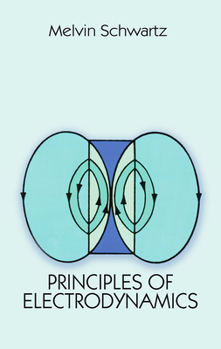Principles of Electrodynamics
Select Format
Select Condition 
Book Overview
Unlike most textbooks on electromagnetic theory, which treat electricity, magnetism, Coulomb's law and Faraday's law as almost independent subjects within the framework of the theory, this well-written text takes a relativistic point of view in which electric and magnetic fields are really different aspects of the same physical quantity. Suitable for advanced undergraduates and graduate students, this volume offers a superb exposition of the essential unity of electromagnetism in its natural , relativistic framework while demonstrating the powerful constraint of relativistic invariance. It will be seen that all electromagnetism follows from electrostatics and from the requirement for the simplest laws allowable under the relativistic constraint. By means of these insights, the author hopes to encourage students to think about theories as yet undeveloped and to see this model as useful in other areas of physics. After an introductory chapter establishing the mathematical background of the subject and a survey of some new mathematical ideas, the author reviews the principles of electrostatics. He then introduces Einstein's special theory of relativity and applies it throughout the rest of the book. Topics treated range from Gauss's theorem, Coulomb's law, the Faraday effect and Fresnel's equations to multiple expansion of the radiation field , interference and diffraction, waveguides and cavities and electric and magnetic susceptibility. Carefully selected problems at the end of each chapter invite readers to test their grasp of the material. Professor Schwartz received his Ph.D. from Columbia University and has taught physics there and at Stanford University. He is perhaps best known for his experimental research in the field of high-energy physics and was a co-discoverer of the muon-type neutrino in 1962. He shared the 1988 Nobel Prize in Physics with Leon M. Lederman and Jack Steinberger.
Format:Paperback
Language:English
ISBN:0486654931
ISBN13:9780486654935
Release Date:October 1987
Publisher:Dover Publications
Length:368 Pages
Weight:0.88 lbs.
Dimensions:0.7" x 5.4" x 8.5"
Customer Reviews
5 ratings
Exceptionally lucid.
Published by Thriftbooks.com User , 18 years ago
This book is somewhat famous for its heuristic derivation of the full Maxwell's equations using Lorentz invariance, but every topic is covered in an exceptionally lucid manner, on a par with Feynman at his best. The book is also a neccessary antidote for the excessive detail and overgeneralization of Jackson.
A perfect introduction
Published by Thriftbooks.com User , 25 years ago
This book is the best introduction to advanced electromagnetic theory I have ever encountered. The author does a masterly job at simplifying the mathematics without over-simplifying the physics. If you're looking to gain a deep understanding of electromagnetics and its relation to the theory of relativity, this book is for you!
Nothing like reading Physics from a Unified Point of View!
Published by Thriftbooks.com User , 25 years ago
Since I've first heard about electricity and magnetism, people always said me that the electric and the magnetic field are nothing less than two sides of the same coin. I really wasn't convinced of that. I've entered at college. Nothing. And I took a (pitiful) undergraduate course on Electromagnetism. Nothing. Not even the Maxwell Equations and the explanation about how they demonstrate the existence of EM waves convinced me. It always appeared that The electric and the magnetic field were two separated things, no matter how much relations between them. I tried even graduate books (say, Jackson), and nothing.Then, Here comes the light... Schwartz' chapter about electric field and relativity, where he concludes merely from Coulomb law and Lorentz invariance that MUST BE A MAGNETIC FIELD, then comes with the EM Field Strength tensor and derives (also from Lorentz invariance)... the very Maxwell's equations! Unbelievable! Why didn't they tell me this before? Or, why don't they teach EM like this? All this not to mention the section about an insight over determining nuclear shape from electric quadrupole moments, the tensorial form of EM laws, Multipole expansion, all that with a remarkable physical insight that is so rare in EM texts (maybe other exception is Landau's Classical Theory of Fields). I only regret the absence of a Lagrangian-Hamiltonian formulation for EM, Green's functions, and gauge invariance with his properties and how this reflect in the formulation of EM laws. But I believe that these topics can be well covered in Landau's text (I really hope so, so I don't need to rely on the insight-less text from Jackson). After all, the physical unity, simplicity and beauty of Schwartz's book is nearly unbeatable. 5 stars "cum lauda"!
A great physicist and entrepreneur writes on his passion
Published by Thriftbooks.com User , 26 years ago
Melvin Schwartz won the Nobel Prize of physics in 1988 by his experiments (with Leon Lederman and Jack Steinberger) on this most elusive of all physical objects, the neutrino. We must be grateful for the fact that he found time to write this precious little book on electrodynamics. It is a gem . I compare it to the very best expositions: Landau-Lifshitz's "Classical Theory of Fields" and the first chapter of the first edition of Heitler's "Quantum Theory of Radiation" .
The theory of Maxwell-Einstein elegantly presented
Published by Thriftbooks.com User , 26 years ago
A beautiful book to wrap up your electrodynamics.Some time ago I read the lectures by Oppenheimer on Electrodynamics (based on notes taken by the student Bryce DeWitt...). I was fascinated by the perfect logic of the approach, which took full profit of relativistic invariance to shorten and clarify the whole theory. I wonder if the book by Melvin Schwartz took Oppenheimer's text as a model. It has the same elegance and logical structure, yet it is a little more leisurely written, being a textbook.It is, so, closer to perfection.






